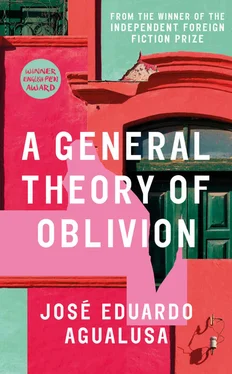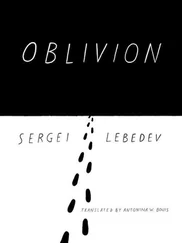‘No chance! That’s one thing this guy won’t do. He’s such a shy little creature.’
Little Chief waited till the end of the show. People were on their way out, really excited, entranced by the miracle they had just witnessed. The businessman approached the performers:
‘Congratulations! Better every time.’
‘Thanks,’ the hippo thanked him with his metallic voice, a dramatic baritone. ‘We had a nice audience.’
Little Chief stroked his back:
‘How are you getting along, over on your little farm?’
‘Very well, padrinho . I’ve got loads of water, and mud for rolling around in.’
Papy Bolingô exploded into bright laughter. His friend laughed with him. Fofo seemed to imitate them, shaking his head, stamping his thick feet on the little stage.
The owner of the establishment, an old guerilla fighter called Pedro Afonso, had lost his right leg when a landmine exploded. This had not robbed him of his love of dancing. To see him dance, you would never have guessed he wore a prosthesis. He came over, when he heard the two friends laughing, tracing out some ornate rumba steps on the beaten-earth floor:
‘God invented music so poor people could be happy.’
He called for beers for the three of them:
‘Let’s drink to the happiness of the poor.’
Little Chief objected:
‘And what about me?’
‘You?! Ah yes, I always forget you’re rich. Here in our country, the first external sign of wealth is usually arrogance. You don’t have any of that about you. The money hasn’t gone to your head.’
‘Thanks. You know how I became rich?’
‘They say a bird came down from the sky, landed in your hand and spat out two diamonds.’
‘That’s almost how it happened. I killed a pigeon, to eat it, and I found two diamonds in the animal’s crop. Just a few days ago I learned whose diamonds they were.’ Little Chief was silent a moment, relishing his friends’ amazement. ‘The diamonds belonged to my neighbour, an old Portuguese lady. She lived in poverty for twenty-something years, despite being rich. And she made me rich — me — without knowing it.’
He told the story, taking time over the details, the twists and turns, inventing whatever he didn’t know with talent and relish. Papy Bolingô wanted to know if the old lady had kept some diamonds. Yes, the businessman said. There had been two left, both so big that none of the pigeons wanted them. The Portuguese woman had offered them to a couple of Mucubal shepherds. ‘It would seem she knew these hicks, God knows how. Luanda does have its mysteries.’
‘True,’ Pedro Afonso agreed. ‘Our capital is full of mysteries. I’ve seen things in this city that would be too much even in a dream.’
Magno Moreira Monte was killed by a satellite dish. He fell off the roof while he was trying to fix the aerial. Then the thing fell on his head. Some people saw the events as an ironic allegory for recent times. The former state security agent, the final representative of a past that few in Angola wished to recall, was felled by the future. It was the triumph of free communication over obscurantism, silence and censorship; cosmopolitanism had crushed provincialism.
Maria Clara liked watching the Brazilian soaps. Her husband, meanwhile, took little interest in television. The pointlessness of the programmes infuriated him. The news bulletins made him even angrier. He watched football matches, supporting Primeiro de Agosto and Benfica. From time to time he’d sit down, in pyjamas and slippers, to re-watch some old black-and-white movie or other. He preferred books. He had collected many hundreds of titles. He planned to spend his final years rereading Jorge Amado, Machado de Assis, Clarice Lispector, Luandino Vieira, Ruy Duarte de Carvalho, Julio Cortázar, Gabriel García Márquez.
When they moved house, leaving the dirty, noisy air of the capital behind them, Monte tried to persuade his wife to do without television. Maria Clara agreed. She’d got into the habit of agreeing with him. For the first weeks, they read together. Everything seemed to be going well. But Maria Clara was getting sad. She’d spend hours on the phone with her friends. Monte then decided to buy and install a satellite dish.
Strictly speaking, he died for love.
Maria da Piedade Lourenço was a small, nervous woman, with a neglected head of greyish-brown hair that rose up like a crest on the top of her head. Ludo couldn’t make out the details of her face. She did, however, notice the crest. She looks like a chicken, she thought, then immediately regretted having thought it. She’d been terribly nervous in the days leading up to her daughter’s arrival. But when the woman appeared in front of her, a great calm settled over her. She told her to come in. The living room was painted now and all set up with new flooring, new doors, the whole thing at the expense of her neighbour, Arnaldo Cruz, who had also insisted on giving her furniture. He had bought the apartment from Ludo, granting her lifetime use of it and committing to pay for Sabalu’s studies until the boy was done with university.
The woman came in. She sat down on one of the chairs, tense, clinging to her handbag as if to a buoy. Sabalu went to fetch tea and biscuits.
‘I’m not sure what I’m supposed to call you.’
‘You can call me Ludovica, that’s my name.’
‘One day will I be able to call you mother?’
Ludo held her hands tight against her belly. Through the windows she could see the highest branches of the mulemba. There was no breeze to disturb them.
‘I realise I’ve got no excuse,’ she murmured. ‘I was only very young, and I was scared. That doesn’t justify what I did.’
Maria da Piedade dragged the chair over to her. She put her right hand on her knee.
‘I didn’t come to Luanda to claim any debt. I came to meet you. I want to take you back to our country.’
Ludo took her hand.
‘This is my country, child. I no longer have any other.’ She pointed at the mulemba. ‘I’ve seen that tree grow. It’s seen me get old. We’ve talked a lot.’
‘I presume you must have family in Aveiro?’
‘Family?’
‘Family, friends, whatever.’
Ludo smiled at Sabalu, who was watching it all, very alert, buried in one of the sofas.
‘My family is this boy, that mulemba tree out there, and a phantom dog. My eyesight gets worse every day. An ophthalmologist friend of my neighbour was here in the apartment to look at me. He said I would never lose my eyesight completely. I still have my peripheral vision. I’ll always be able to make out the light, and the light in this country is a riot. In any case, I don’t aspire to any more: the light, Sabalu reading to me, the joy of a pomegranate every day.’
The pigeon that changed Little Chief’s life — and also sated his hunger — was called Love. Ridiculous, you think? Take it up with Maria Clara. It was she who gave it the name. The future wife of Magno Moreira Monte was, around the time of Independence, a young high school student. Her father, Horácio Capitão, a customs officer, bred carrier pigeons. Those named by Maria Clara tended to be champions. Before Love, it had been so with Beloved (1968), Amorous (1971), Clamorous (1973) and Enchanted (1973). Love was nearly thrown away while still an egg. ‘It’s no good,’ explained Horácio Capitão to his daughter. ‘Look at the shell: crinkled, very thick. A healthy, strong pigeon, a good flyer, is born from an egg with a smooth, bright shell.’
The girl turned the egg around in her long fingers, and prophesied:
Читать дальше












